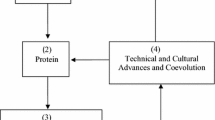Abstract
Michael Tomasello’s new book Why We Cooperate explores the ontogeny and evolution of human altruism and human cooperation, paying particular attention to how such behaviors allow humans to create social institutions.
Similar content being viewed by others
Notes
From here on, page numbers without a preceding year will refer to pages in the 2009 hardcover version of Tomasello’s Why We Cooperate.
This is Searle’s (1995) distinction between ontologically objective and ontologically subjective parts of the world. It is worth noting that these ontological distinctions can only go so far, at least in the present context. Humans bring to the process of foraging an immense collection of acquired knowledge, along with a conceptual apparatus that categorizes the biological world. This knowledge and these categories are not “out there” in some observer-independent space.
References
Boesch C (2001) Chimpanzee hunters: chaos or cooperation in the forest. In: Dugatkin LA (ed) Model systems in behavioral ecology: integrating conceptual, theoretical, and empirical approaches. Princeton University Press, Princeton and Oxford
Boesch C (2005) Joint cooperation among wild chimpanzees: taking natural observations seriously. Peer Commentary to Tomasello et al. (2005)
Bratman M (1992) Shared cooperative activity. Phil Rev 101(2):327–341
Brownell C, Ramani G, Zerwas S (2006) Becoming a social partner with peers: cooperation and social understanding in 1- and 2-year-olds. Child Dev 77(4):803–821
Calcott B (2008) The other cooperation problem: generating benefit. Biol Philos 23:179–203
Eckerman C, Whitehead H (1999) How toddler peers generate coordinated action: a cross-cultural exploration. Early Educ Dev 10(3):241–266
Kerr B, Godfrey-Smith P, Feldman M (2004) What is altruism? Trends Ecol Evol 19(3):135–140
Liszkowski U, Carpenter M, Striano T, Tomasello M (2006) Twelve- and 18-month-olds point to provide information for others. J Cogn Dev 7:173–187
Melis A, Hare B, Tomasello M (2006) Chimpanzees recruit the best collaborators. Science 31:1297–1300
Searle J (1995) The construction of social reality. Free Press, New York
Skyrms B (2004) The stag hunt and the evolution of social structure. Cambridge University Press, Cambridge
Sober E, Wilson DS (1998) Unto others: the evolution and psychology of unselfish behavior. Harvard University Press, Cambridge
Sterelny K (2003) Though in a hostile world: the evolution of human cognition. Blackwell, Oxford
Sterelny K (2007) Social intelligence, human intelligence, and niche construction. Phil Trans R Soc Series B 362:719–730
Sterelny K (forthcoming) The fate of the third chimpanzee
Tomasello M (1999) The cultural origins of human cognition. Harvard University Press, Cambridge
Tomasello M (2004) What kind of evidence could refute the UG hypothesis? Commentary on Wunderlich. Stud Lang 28(3):642–645
Tomasello M (2009) Why we cooperate. MIT Press, Cambridge
Tomasello M, Carpenter M, Call J, Behne T, Moll H (2005) Understanding and sharing intentions: the origins of cultural cognition. Behav Brain Sci 28:675–691
Warneken F, Tomasello M (2007) Helping and cooperation at 14 months of age. Infancy 11(3):271–294
Warneken F, Tomasello M (2009) Varieties of altruism in children and chimpanzees. Trends Cogn Sci 13(9):397–482
Warneken F, Chen F, Tomasello M (2006) Cooperative activities in young children and chimpanzees. Child Dev 77(3):640–663
Acknowledgments
This research has been supported by a grant from the National Academies Keck Futures Initiative (grant number: NAKFI HS11). I would also like to thank Patrick Forber for helpful and thorough comments.
Author information
Authors and Affiliations
Corresponding author
Rights and permissions
About this article
Cite this article
McLoone, B. Collaboration and human social evolution: review of Michael Tomasello’s why we cooperate (MIT Press, 2009). Biol Philos 27, 137–147 (2012). https://doi.org/10.1007/s10539-010-9227-1
Received:
Accepted:
Published:
Issue Date:
DOI: https://doi.org/10.1007/s10539-010-9227-1




